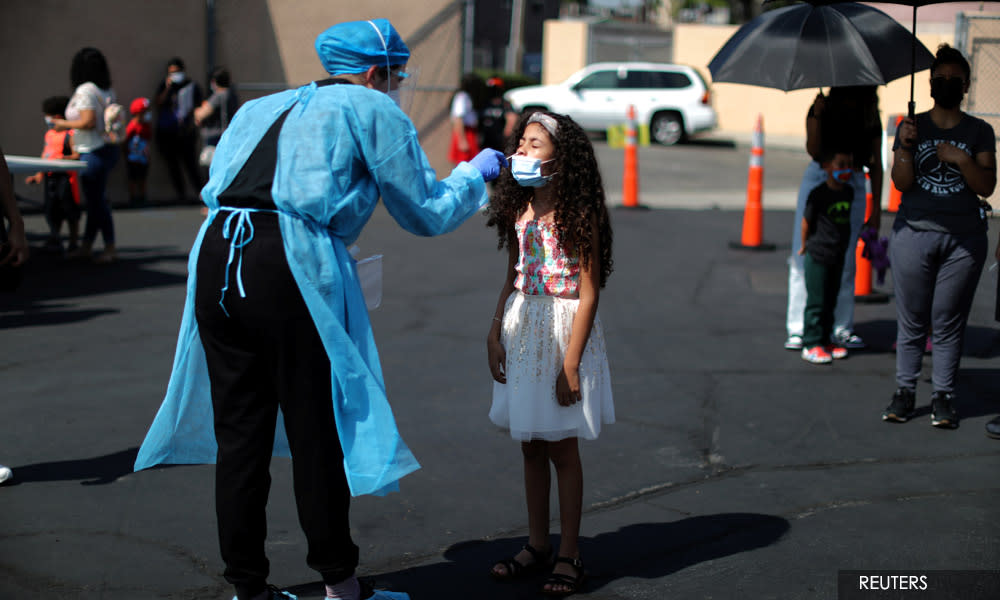Outbreak in California classroom underscores Delta variant risks

As the Education Ministry postpones the resumption of face-to-face lessons at schools, a Covid-19 outbreak at a California classroom may offer some lessons on what risks might lie ahead.
According to a case study published last week, the outbreak is centred at an elementary classroom in Marin County in California, USA, where the outbreak’s index case conducted lessons as the teacher.
The teacher infected half the class of 24 children - who were too young to be vaccinated - and the cluster grew to infect at least 27 people, from May 23 to June 12.
Researchers found the school took several precautions against Covid-19 by leaving doors and windows open, separating all desks six feet (1.82m) apart, and placed portable high-efficiency particulate air filters (Hepa) in each classroom.
Interviews with the students’ parents also suggested that the students strictly complied with the masking and social distancing guidelines of the US Centers for Disease Control (CDC).
Unvaccinated, unmasked and reading aloud
However, their teacher is one of only two teachers at the school who were still unvaccinated.
The teacher started experiencing nasal congestion and fatigue on May 19 but continued to work until May 21, after attributing the symptoms to allergies.
In addition, the teacher reportedly unmasked occasionally during this period to read aloud in class, which is contrary to the school’s rules requiring teachers and students to be masked indoors.
The teacher’s symptoms eventually developed into cough, fever and headache. On May 23, the teacher informed the school of a Covid-19 test performed on May 21 had yielded a positive result.
Subsequently, 22 of the 24 students underwent testing, of which 12 were positive including all five sitting at the first row. The disease’s attack rate was lower towards the back of the classroom.

In addition, students in another classroom also began experiencing symptoms on May 22. Six in that classroom eventually tested positive, including three classmates who held a sleepover.
Meanwhile, one case was reported in each of four other classrooms at the same school. These are siblings of three of the students in the infected teacher's class, who are presumed to have been infected at home.
The outbreak also spread beyond the school by infecting four of the students’ parents, three of whom are fully vaccinated.
None of the school’s other staff was infected, and none of the 27 people infected required hospitalisation.
Sequencing data is available for 18 of the cases, which all turned out to be the highly transmissible Delta variant. It also helped genomically confirm that the cases were linked.
'Vaccines worked, but precautions still necessary'
The authors of the case study noted that the outbreak’s attack rate in the school is high, underscoring the Delta variant’s increased transmissibility especially in unvaccinated populations such as schoolchildren.
However, the attack rate in the community appeared to be lower than previously reported Delta variant outbreaks, which the authors attributed to the high vaccination rate in the surrounding community.
The report said about 72 percent of the eligible population in the city had been fully vaccinated.

“These findings support evidence that the current Covid-19 vaccines with Food and Drug Administration approval or Emergency Use Authorisation are effective against the Delta variant; however, transmission risk remains elevated among unvaccinated persons in schools.
“In addition to vaccination of eligible persons, implementation of and strict adherence to multipronged non-pharmaceutical prevention strategies including proper masking, routine testing, ventilation and staying home while symptomatic are important to ensure safe school instruction,” the authors wrote.
The study was published in the CDC’s Morbidity and Mortality Weekly Report on Aug 27.
For the record, one of the study’s seven authors declared stock ownership in Pfizer and Moderna as a potential conflict of interest. No potential conflicts of interest have been disclosed by the other authors.
Most Malaysian teachers already vaccinated
In Malaysia, states under Phase 2 and 3 of the National Recovery Plan were originally slated to resume some face-to-face instruction on Sept 1, but this has been postponed until Oct 3, citing safety reasons.
Schools are closed indefinitely in Phase 1 states, while Phase 2 states would only reopen classes for examination year students. Schools in Phase 3 states were originally slated for full reopening.
At a press conference yesterday, Health Minister Khairy Jamaluddin said 96.5 percent of 412,000 teachers in the country had received at least one Covid-19 vaccine dose, while 83.5 percent have completed both doses.
For school support staff, 84.8 percent have received at least one dose.
Khairy said the ministry is studying options for dealing with those who refuse vaccination and not just among school staff, such as by requiring frequent Covid-19 testing.
READ MORE: Govt to keep dangling carrot of vaccination but stick is not far behind - KJ
Previously, it was reported that 779 teachers in Johor refused Covid-19 vaccination.
After meeting the teachers’ representatives, Johor Crown Prince Tunku Ismail Sultan Ibrahim said 396 of the teachers refused vaccination because they had reservations about the vaccines.
Another 383 teachers reported postponed vaccination due to allergies, pregnancy or certain health conditions.
Some of the teachers had agreed to be vaccinated after the meeting, Tunku Ismail said last Friday.


